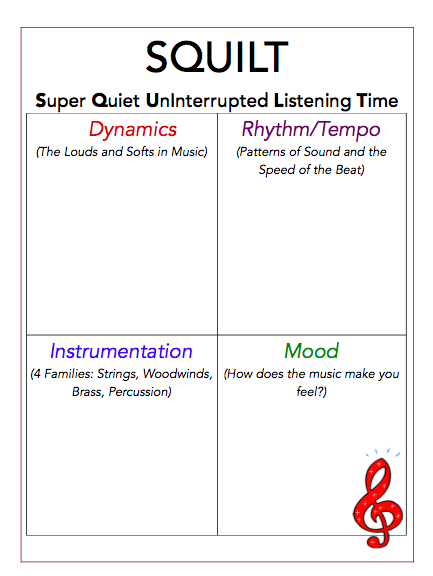
Aaron Copland is my FAVORITE composer. His music appeals to children, and is also perfect for a patriotic music study.
When the Fourth of July rolls around each year I find myself playing a lot more Copland than usual.
Fanfare for the Common Man was written by Copland in 1942. It was inspired by then Vice President's Henry A. Wallace's speech proclaiming the dawning century as "The Coming of the Common Man".
Download the SQUILT listening sheet and print for your student(s):

If you aren't familiar with how Super Quiet UnInterrupted Listening time works, visit this post for a crash course!
First Listening
Listen to the first 3:25 of this video ONLY!
We will get to the end of the video later -- for now, just allow your student to listen to this first part, which is Aaron Copland's original piece. The end of the video is Emerson, Lake & Palmer's arrangement (which is wonderful, too!).
Remember, students should be super quiet as they listen. Direct them to listen for Dynamics, Rhythm/Tempo, Instrumentation, and Mood.
Younger students can just come up with a picture in their mind while they listen.
Dynamics
Dynamics are the louds and softs in music. What variations do you hear - this piece runs the full spectrum.
Rhythm/Tempo
The actual speed of this piece (as written) is "very deliberately". There are a few signature rhythms in this piece, too. If you are interested, you can view the score of the piece, too.
Instrumentation
Now is a good time to learn about the Brass Family. There are also percussion instruments (timpani and gong) playing. In fact, a FANFARE is actually a piece of music played by brass instruments.
You can view the lesson about this piece at Classics for Kids for more information.
Mood
The mood of this piece is hopeful, expectant and optimistic. Encourage your children to come up with adjectives to describe the music. Younger children can draw pictures to match what they are hearing.
Extension
Listen to the rest of the music (from 3:25 to the end) to hear another arrangement of this piece. Children will like this very much.
- What changes were made?
- How do those changes make you feel?
- What STYLE of music is it now?
- Do you like this arrangement of the piece?
Create a quick unit study:
- Read a great biography about Aaron Copland. We like Aaron Copland - Getting to Know the World's Greatest Composers.
- Listen to more Copland music - my favorite is Copland Conducts Copland.
- Use SQUILT Lesson #4, which highlights another piece of Copland's music.
Did you know that SQUILT is full fledged music appreciation curriculum for children ( for elementary and middle grades students) ?
This lesson is just a short example of what appears in the curriculum.
All you have to do is download one (or more!) the ebook, have an internet connection and basic school supplies and you are ready to go.
Visit the SQUILT site for more details!
I hope you've enjoyed this patriotic music lesson! Do you play patriotic music in your home during our America's greatest national holidays?

